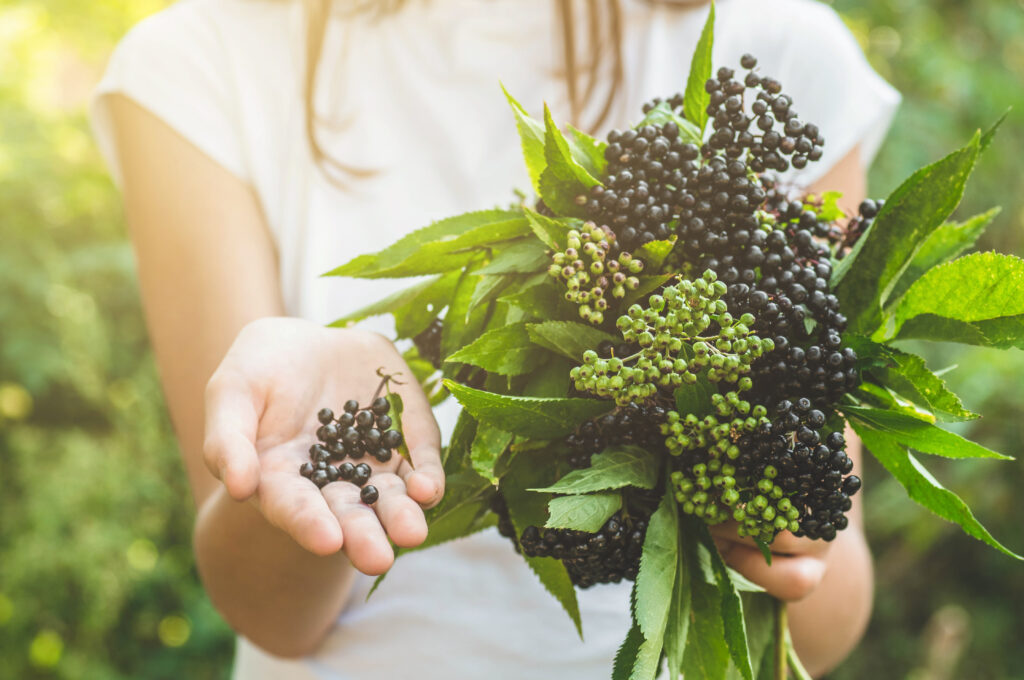Time and again I am asked, ‘Do you have Elderberry?’. My daughter has used this stuff for years. She swears by it. Now, more than ever, so many people are seeking out this tiny, deep blue berry. But why?
In History & Folklore
For more than two millennia mankind has depended upon the Elderberry for both nourishment and remedy. Hippocrates, the Father of Modern Medicine, referred to the Elderberry as the ‘Medicine Chest’ of all herbs. Native Americans have utilized it for centuries. Elderberry remains one of their most important traditional medicines still in use.
Today the Elderberry is commonly used to make jelly, wine, pies, and syrup, which remains a ‘cold & flu’ season staple for many.
What is Elderberry?
Elderberry is a deciduous multi-stemmed shrub. At maturity, small deep purple almost black berries hang upside down bending stems under the weight. A single cluster can contain as many as 2000 berries. The American Elder [Sambucus nigra] is a close relative of Europe’s Black Elder.
The fruit of the North American Black Elderberry is excellent for a variety of uses. Unripe or raw berries, seeds, stems, leaves, branches, and roots are poisonous to humans. They contain a cyanide-inducing glycoside. Elder flowers (without stems) are edible. The fruit is a tiny berry, of which about 50% is seed. Ripe berries, juice, pulp and skin only, are safe to eat after proper processing. The heat of cooking destroys glycosides.
Warning: Toxicity varies between species. The red berries of other species are toxic and should not be used.
What does the Science have to say?
Preliminary research suggests that supplementation with elderberry was found to reduce or relieve symptoms of cold, flu and other upper respiratory infections. Often treated with over-the-counter drugs, antibiotics, and antiviral medications, Elderberry may prove to be a safer alternative and reduce the over-use of antibiotics. There have been no large-scale studies on the safety or effectiveness of Black Elderberry. Basically, more testing is needed so the jury is still out.
To be clear there have been NO studies on elderberry effectiveness against COVID-19.
Are we grasping for miracles or is there really something to this?
Elderberry is high in vitamin C and packed with antioxidants, which boost the immune system. I believe Elderberry shows very real potential. Do not take my word for it. Do your homework and make an informed decision.
Be Happy, Be Well, Be Blessed,
o0~
_________
One complaint I hear all too often is, that it is only available at certain times of the year. Another big one is that it is so expensive. It does not have to be. It is super simple to make Elderberry Syrup in your own kitchen.
Try out our Classic Elderberry Syrup recipe and let us know how you like it. We also have an Instant Pot version and carry all the herbs and spices you need to make it yourself.
_________
References:
Perdue University | College of Agriculture
The Herb Society of America | Elderberry Guide
University of California | Indigenous Perspectives on Elderberry Uses
NIH | Elderberry
National Library of Medicine | Black elderberry (Sambucus nigra) supplementation
National Library of Medicine | Sambucus nigra (black elder) as alternative treatment for cold and flu
#Elderberry #Syrup #Recipe #YUM #Immunity #Health #Wellness #Prevention #DIY #FYI #TheRestOfTheStory #WhatsNew #WhatsAllTheBuzzAbout
210225_Elderberry
